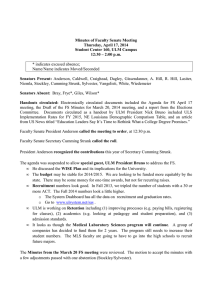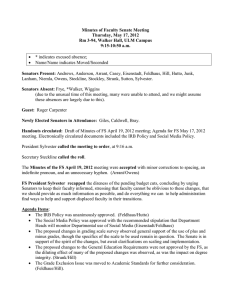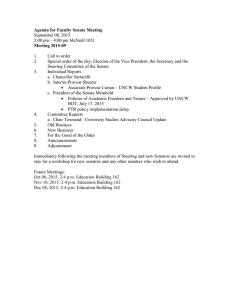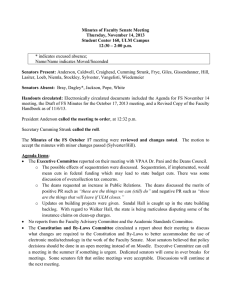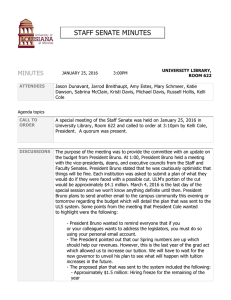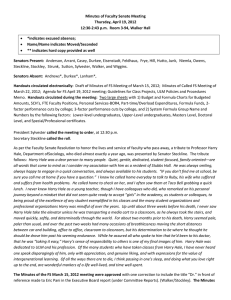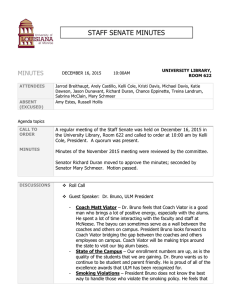Minutes of Called Faculty Senate Meeting Thursday, March 22, 2012
advertisement
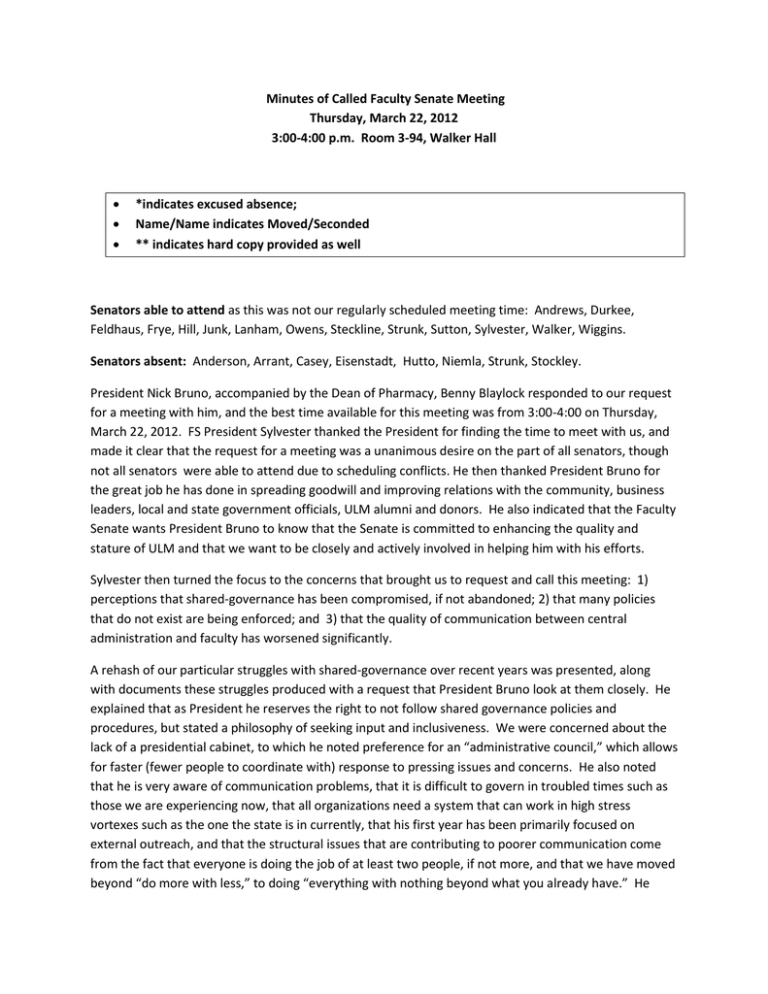
Minutes of Called Faculty Senate Meeting Thursday, March 22, 2012 3:00-4:00 p.m. Room 3-94, Walker Hall *indicates excused absence; Name/Name indicates Moved/Seconded ** indicates hard copy provided as well Senators able to attend as this was not our regularly scheduled meeting time: Andrews, Durkee, Feldhaus, Frye, Hill, Junk, Lanham, Owens, Steckline, Strunk, Sutton, Sylvester, Walker, Wiggins. Senators absent: Anderson, Arrant, Casey, Eisenstadt, Hutto, Niemla, Strunk, Stockley. President Nick Bruno, accompanied by the Dean of Pharmacy, Benny Blaylock responded to our request for a meeting with him, and the best time available for this meeting was from 3:00-4:00 on Thursday, March 22, 2012. FS President Sylvester thanked the President for finding the time to meet with us, and made it clear that the request for a meeting was a unanimous desire on the part of all senators, though not all senators were able to attend due to scheduling conflicts. He then thanked President Bruno for the great job he has done in spreading goodwill and improving relations with the community, business leaders, local and state government officials, ULM alumni and donors. He also indicated that the Faculty Senate wants President Bruno to know that the Senate is committed to enhancing the quality and stature of ULM and that we want to be closely and actively involved in helping him with his efforts. Sylvester then turned the focus to the concerns that brought us to request and call this meeting: 1) perceptions that shared-governance has been compromised, if not abandoned; 2) that many policies that do not exist are being enforced; and 3) that the quality of communication between central administration and faculty has worsened significantly. A rehash of our particular struggles with shared-governance over recent years was presented, along with documents these struggles produced with a request that President Bruno look at them closely. He explained that as President he reserves the right to not follow shared governance policies and procedures, but stated a philosophy of seeking input and inclusiveness. We were concerned about the lack of a presidential cabinet, to which he noted preference for an “administrative council,” which allows for faster (fewer people to coordinate with) response to pressing issues and concerns. He also noted that he is very aware of communication problems, that it is difficult to govern in troubled times such as those we are experiencing now, that all organizations need a system that can work in high stress vortexes such as the one the state is in currently, that his first year has been primarily focused on external outreach, and that the structural issues that are contributing to poorer communication come from the fact that everyone is doing the job of at least two people, if not more, and that we have moved beyond “do more with less,” to doing “everything with nothing beyond what you already have.” He catalogued some of the ideas being explored to attempt to improve communication (newsletters/software/calendar coordinations). He described the efforts to accurately count SCH’s, and the frustrations of implementing proposals—as between the idea/proposal and the implementation, falls the shadow of what overtaxed personnel can actually accomplish. He discussed upcoming budget cuts, the notion of a measured productivity scale, and the implementation of post-baccalaureate certificates requiring 15-24 hours of additional course work, to address workforce development issues. President Bruno responded to our questions very thoroughly, asked us in return for examples, which we were readily able to supply. It was, in this recorder’s humble opinion, a very frank, candid and sobering session, for which we were most appreciative of the opportunity of having. The meeting adjourned at 4:00. Respectfully submitted, Dr. C. Turner Steckline, Faculty Senate Secretary
